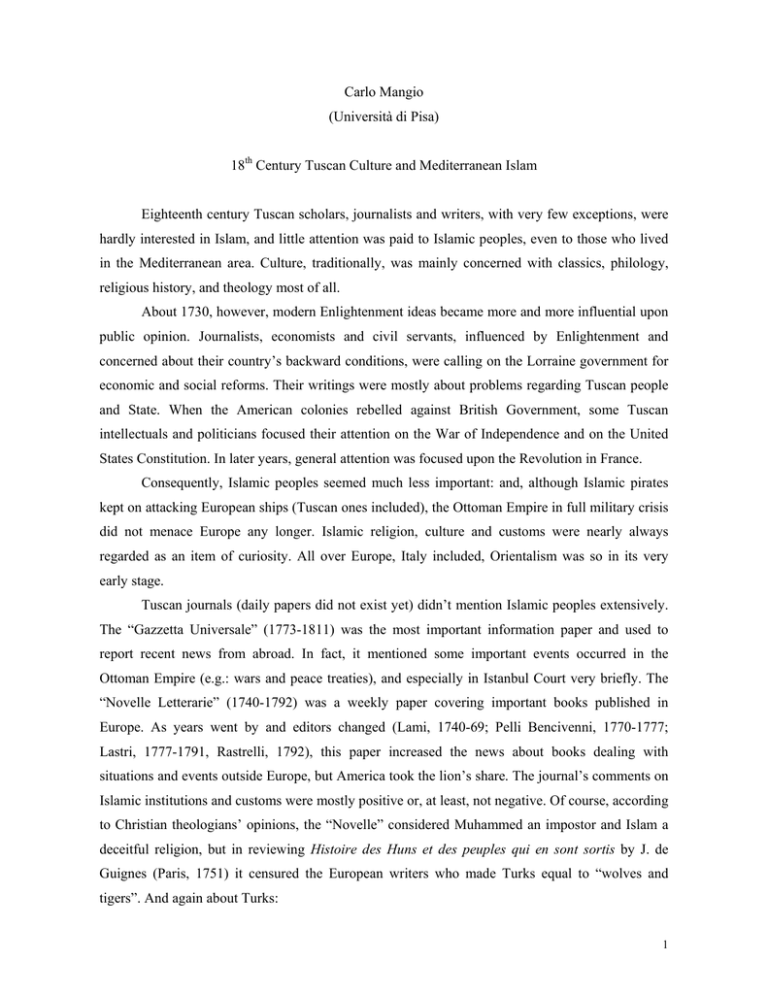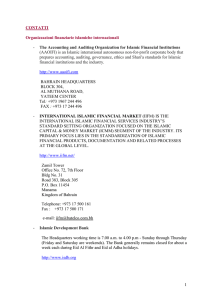Carlo Mangio (Università di Pisa) 18
advertisement

Carlo Mangio (Università di Pisa) 18th Century Tuscan Culture and Mediterranean Islam Eighteenth century Tuscan scholars, journalists and writers, with very few exceptions, were hardly interested in Islam, and little attention was paid to Islamic peoples, even to those who lived in the Mediterranean area. Culture, traditionally, was mainly concerned with classics, philology, religious history, and theology most of all. About 1730, however, modern Enlightenment ideas became more and more influential upon public opinion. Journalists, economists and civil servants, influenced by Enlightenment and concerned about their country’s backward conditions, were calling on the Lorraine government for economic and social reforms. Their writings were mostly about problems regarding Tuscan people and State. When the American colonies rebelled against British Government, some Tuscan intellectuals and politicians focused their attention on the War of Independence and on the United States Constitution. In later years, general attention was focused upon the Revolution in France. Consequently, Islamic peoples seemed much less important: and, although Islamic pirates kept on attacking European ships (Tuscan ones included), the Ottoman Empire in full military crisis did not menace Europe any longer. Islamic religion, culture and customs were nearly always regarded as an item of curiosity. All over Europe, Italy included, Orientalism was so in its very early stage. Tuscan journals (daily papers did not exist yet) didn’t mention Islamic peoples extensively. The “Gazzetta Universale” (1773-1811) was the most important information paper and used to report recent news from abroad. In fact, it mentioned some important events occurred in the Ottoman Empire (e.g.: wars and peace treaties), and especially in Istanbul Court very briefly. The “Novelle Letterarie” (1740-1792) was a weekly paper covering important books published in Europe. As years went by and editors changed (Lami, 1740-69; Pelli Bencivenni, 1770-1777; Lastri, 1777-1791, Rastrelli, 1792), this paper increased the news about books dealing with situations and events outside Europe, but America took the lion’s share. The journal’s comments on Islamic institutions and customs were mostly positive or, at least, not negative. Of course, according to Christian theologians’ opinions, the “Novelle” considered Muhammed an impostor and Islam a deceitful religion, but in reviewing Histoire des Huns et des peuples qui en sont sortis by J. de Guignes (Paris, 1751) it censured the European writers who made Turks equal to “wolves and tigers”. And again about Turks: 1 Gli uomini sono per tutto i medesimi e spesso con tutta quella materialità che gli rende dispregevoli agli occhi prevenuti hanno meno vizi, più franchezza, più lealtà, più buona fede e forse in generale più sode virtù1 (“Novelle letterarie”, year 1752, c.30). Regarding slavery, the “Novelle” reproached the writers who gave too unfavourable judgements about Islamic customs. The “Novelle” admitted the splendid and glorious Arab civilisation which spread as far as Spain and Iran and expressed a desire for a deep and widespread knowledge of Arab language and civilisation among Europeans. The “Novelle” depicted the cruelty of Moroccan monarch Muley Ismael in a rather sensational manner, but specified that his inhumanity was a natural personal attribute, not an effect of Islamic customs, that did not approve those behaviours. The “Novelle” mentioned the letters Tuscan Carlo Antonio Stendardi wrote from Istanbul, for refuting the opinion that the Turkish government was completely despotic. Comments about Islam were unusual in the “Giornale de’ letterati” (Florence, 1742-56, and Pisa, 1757-62) and in the “Giornale de’ letterati” published by Pisa University (1772-1796), but they repeated the cliché of Islam as an untrue religion and of Mohammed as an impostor. Leghorn journals (“Magazzino italiano”, 1752-3 and “Magazzino toscano d’instruzione e di piacere”, 17547) hardly mentioned Islamic peoples, and that’s amazing if we consider the consolidated trading relations between Leghorn, Middle East and Maghreb. Turkish, Greek and Arab traders stayed in Leghorn and so did the Tuscan ones in Arab and Oriental towns, not to mention slaves and corsairs. The “Magazzino italiano” briefly mentioned a citizen from Leghorn named Cei who travelled through Maghreb. In the study about Eighteenth century Tuscan culture, we often refer to Pelli’s Efemeridi. Giuseppe Pelli Bencivenni, a man of great erudition, civil servant, and editor of “Novelle letterarie”, regularly wrote about a number of significant men, events and books in his Efemeridi, a sort of (unpublished) long diary (1759-1807). Did he write about Islam and Islamic peoples? He did, but neither frequently nor on matters of importance. Pelli doesn’t appear to have been much interested in Islamic peoples. He preferred Americans and Chinese. On the theme of Islamic peoples, he had read some travellers’ reports and history books, but he took a lot of clichés as true without trying to go deeper. In Efemeridi he took notes on information (e.g. some statistics of Istanbul population) and on curiosities: he overly emphasized Turks and Iranians’ gymnastic skill and, after noting the great number of Iranian prostitutes, concluded that warm climate promoted sexual intercourse. But Pelli had no prejudices towards Islamic peoples and culture. In his opinion, some Christian 2 sovereigns, who faced good fame, were as inhuman as the Turkish Sultan whose cruelty was described by a lot of travellers. Regarding Letteratura turchesca by Giambattista Toderini (Venezia, 1787): Molto è ciò che quivi s’impara e che deve riuscir nuovo a coloro i quali hanno una cattiva prevenzione di una nazione di cui tanto abbiamo addietro temuto2 (Efemeridi, s. II, v. XV, p.2853). Since 1783 and up to 1791, Francesco Becattini, Tuscan journalist and writer, published three works concerning Islamic peoples: Storia della Crimea Piccola Tartaria ed altre provincie circonvicine soggetto delle recenti vertenze tra la Russia e la Porta Ottomana (1st ed. Napoli 1783; 2nd. ed. Venezia 1785), Istoria della città e Regno d’Algeri (Napoli, 1785), Storia ragionata dei Turchi e degl’Imperatori di Costantinopoli, di Germania e di Russia e d’altre potenze cristiane (Venezia 1788-1791). Becattini made a living by writing about many different subjects and his three books mostly relate military events in flat style, without studying in depth Islamic customs, institutions or culture, only slightly mentioned. For a long time, Venetian readers had taken interest in Islamic things (Turkish ones especially) as an effect of trade and war fortunes of their Country. Towards the end of the century, also Tuscan ones seemed to have increased their interest in Arabs and Turks. Two notable Tuscan travellers, Giovanni Mariti3 and his cousin Domenico Sestini4, published their reports and historical works in Florence and Leghorn (Sestini in Roma too), which were reviewed by the “Novelle letterarie” very favourably. Mariti,5 born in Florence, a naturalist and a lover of archaeology and history, was in Cyprus from 1760 to 1768 and travelled through Palestine and Syria gathering ancient and modern material for his long and circumstantial works, which I didn’t have yet time enough to examine singularly. In his long relation Viaggi per l’Isola di Cipro e per la Soria e per la Palestina, translated in German, Swedish, English and French, Mariti lingered on the natural conditions and resources of the lands he visited, critically described economic and social situations, 1 Man is the same everywhere and often those who act instinctively and coarsely are despised by prejudiced people but prove to be less depraved, more sincere, loyal, reliable and maybe honest than the others. 2 The readers of this book learn a lot of things which maybe are new to them who are prejudiced against a nation which not long ago frightened us so much. 3 I refer to Mariti’s works as follows: Viaggi per l’isola di Cipro e per la Soria e Palestina … dall’anno 1760 al 1768, 9 voll., Lucca-Firenze, 1769-1776; Istoria della guerra della Soria, 2 voll., Firenze, 1772-74; Memorie istoriche del popolo degli Assassini e del Vecchio della Montagna loro capo e signore, Livorno 1787; Istoria di Faccardino GrandEmir dei Drusi, Livorno, 1787; Viaggio da Gerusalemme per le coste della Soria, 2 voll., Livorno, Masi, 1787. 4 I refer to Sestini’s works as follows: Lettere … scritte dalla Sicilia e dalla Turchia a diversi suoi amici in Toscana, 7 voll., Firenze-Livorno, 1779-84; Viaggio da Costantinopoli a Bassora, Yverdun, 1786; Viaggio da Costantinopoli a Bukaresti fatto l’anno 1779 con l’aggiunta di diverse lettere relative a varie produzioni, ed osservazioni asiatiche, Roma, 1794. 5 I thank Professor Renato Pasta for making me read his short Mariti’s biography which is going to be published in Dizionario biografico degli Italiani. 3 and expressed his doubts about traditional history. He condemned, quoting Montesquieu, Turkish despotism and maladministration, mentioned officials and officers’ bribery, but admitted that the Turkish government had imposed religious tolerance and Christians had their places of worship and institutions (churches, monasteries and so on), criticized Islamic religion but also some Christian beliefs about holy Palestinian places (Mariti assimilated Enlightened criticism). In his opinion an Islamic woman (Arab one especially) was almost slave to the men of her family, but she could obtain divorce. In Mariti’s historical pages Crusaders were as cruel as Turks, Jesuits and the members of Assassin Islamic sect were equal in absolute submission to respective leader. He praised Drusus Emir Fakr ad-Din highly because he had cordial relations with Tuscan Grand Dukes and tried to modernise the customs of his subjects following European standards. Even though in Mariti’s opinion European civilisation was absolutely the best, his books contain a balanced and many-sided description of the Middle East society. Domenico Sestini, keen on natural sciences and a collector and investigator of ancient coins, medals and inscriptions, was in Istanbul and travelled in 1779 up to Bucharest and in 1781 as far as Bassora. In his published letters and relations, he emphasized Turkish hospitality and religious tolerance and sometimes censures Catholic missionaries’ loose behaviour. He criticized strongly the Turkish government’s violence that, in his opinion, did have counter effects, because riots were frequent and robberies too. But he blamed Europeans because they didn’t have enough knowledge and interest in the complex and refined Turkish civilization. As a result of travellers’ relations and of the growing and enlightened curiosity and criticism, cultivated Tuscans were getting a knowledge of Islam. Although they didn’t get a hold on the complex reality of it, at least the authors of these relations aimed at being free from the heavy biases of recent past. Nevertheless Islam continued to be a subject of minor interest for Tuscan (I daresay Italian) scholars, politicians, journalists and writers, whose attention was completely drawn by the Italian and European situation for a long time. 4
